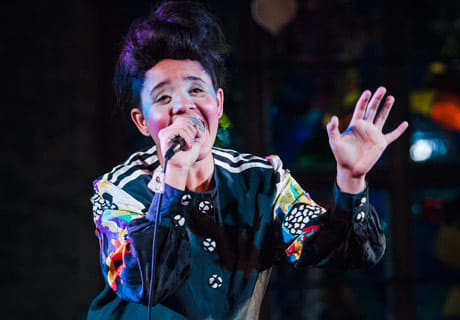Last night (October 19), Lido Pimienta performed the closing show of this year's X-Avant festival, offering a multimedia, collaborative performance that intermittently soared and stumbled over its high intentions.
One of the show's draws was that Pimienta had promised to incorporate friends and fellow musicians into the evening, including percussionist Mas Aya, violinist Melody McKiver and a handful of others. Pimienta started by giving each artist their own time on the stage, which unfortunately hurt the night's momentum and highlighted the fact that none of her backing musicians were as interesting or engaging as solo performers as she was. The revolving stage took on the feel of an art school talent show instead of the one-off, creative collaboration it was supposed to be.
The energy in the venue changed dramatically when Pimienta began her proper performance. Everything fell into place as she assumed the microphone with her powerful voice, and her collaborators offered a nuanced, responsive platform from which she could leap. Especially exciting was the interplay between Pimienta's voice and the saxophone, as each one completed the other's musical expressions and added warmth to her compositions.
She played songs from her upcoming album, La Papessa, or "The High Priestess," making theatrical use of the converted church venue. At times she took on the body language and voice of a preacher, albeit one with a very untraditional message. We were told she'd give a show that "Unpacks her own many identities as a woman, immigrant, mother, student, rebel and money-making artist," and that she would "preach love, self-expression, equity and the destruction of gender biases amidst a whirlwind of quasi-religious fervour." The night's visuals, provided by Adrienne Crossman and Peter Rahul, addressed "issues surrounding stigmas towards mental health."
The show's noble intentions were somewhat lost in the mix, as Pimienta performed under the weight of her own high concepts and only occasionally conveyed all of their parts harmoniously. For a performer that relies so heavily on communication, the audience had to rely too much on reading the program and piecing together the ideas behind what she was doing instead of engaging directly with her. Pimienta is undoubtedly capable of more, and we're excited to see where this goes once she moves more easily into her new material.
One of the show's draws was that Pimienta had promised to incorporate friends and fellow musicians into the evening, including percussionist Mas Aya, violinist Melody McKiver and a handful of others. Pimienta started by giving each artist their own time on the stage, which unfortunately hurt the night's momentum and highlighted the fact that none of her backing musicians were as interesting or engaging as solo performers as she was. The revolving stage took on the feel of an art school talent show instead of the one-off, creative collaboration it was supposed to be.
The energy in the venue changed dramatically when Pimienta began her proper performance. Everything fell into place as she assumed the microphone with her powerful voice, and her collaborators offered a nuanced, responsive platform from which she could leap. Especially exciting was the interplay between Pimienta's voice and the saxophone, as each one completed the other's musical expressions and added warmth to her compositions.
She played songs from her upcoming album, La Papessa, or "The High Priestess," making theatrical use of the converted church venue. At times she took on the body language and voice of a preacher, albeit one with a very untraditional message. We were told she'd give a show that "Unpacks her own many identities as a woman, immigrant, mother, student, rebel and money-making artist," and that she would "preach love, self-expression, equity and the destruction of gender biases amidst a whirlwind of quasi-religious fervour." The night's visuals, provided by Adrienne Crossman and Peter Rahul, addressed "issues surrounding stigmas towards mental health."
The show's noble intentions were somewhat lost in the mix, as Pimienta performed under the weight of her own high concepts and only occasionally conveyed all of their parts harmoniously. For a performer that relies so heavily on communication, the audience had to rely too much on reading the program and piecing together the ideas behind what she was doing instead of engaging directly with her. Pimienta is undoubtedly capable of more, and we're excited to see where this goes once she moves more easily into her new material.
